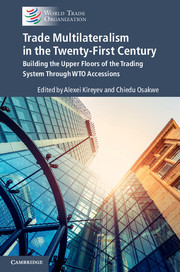 Trade Multilateralism in the Twenty-First Century
Trade Multilateralism in the Twenty-First Century from PART III - Accessions Acquis: Thematic Perspectives and Implementation Challenges
Published online by Cambridge University Press: 28 November 2017
Abstract
The WTO Agreement on Trade-Related Aspects of Intellectual Property Rights (TRIPS) established the first multilateral understanding of what constitutes a standard for ‘adequate’ and ‘effective’ protection of intellectual property rights, and established a new mechanism for monitoring and reviewing how these standards are met. The policy and legal framework defined by the TRIPS Agreement has, in the two decades since it entered into force, progressively gained acceptance as a legitimate, balanced and transparent set of standards. Since then, however, two parallel sets of negotiations have revisited the standards defined by TRIPS: the multilateral WTO accession negotiations, and bilateral and regional trade negotiations outside the WTO. In each case, TRIPS standards have been further elaborated, and timelines for their implementation altered, in a manner that produces a layering of rules upon the foundation of TRIPS. However, the institutional, legal and policy implications of these two lines of development contrast sharply. This chapter reviews the main lines of development of rules relating to intellectual property in the accession processes, and contrasts these with the parallel developments outside the WTO. It concludes with an analysis of the policy and practical lessons that can be derived from contrasting these two processes.
Introduction
The entry into force of the WTO Agreement on Trade-Related Aspects of Intellectual Property Rights (TRIPS), along with the inception of the WTO in 1995, was a turning point for multilateral governance and a catalyst for a transformation of law, policy and international relations in intellectual property (IP) and a host of related policy fields. Through the linking concept of ‘trade-related aspects’ of IP rights, the TRIPS negotiations forged a transformation both in the international governance of IP and in the very conception of trade within multilateral trade law and policy. The notion of a ‘paradigm shift’ seems apt, since TRIPS:
• decisively reframed IP as a positive subject of international trade law, acknowledging that expectations on ‘adequate and effective’ protection of IP form a legitimate subject for international trade negotiations – as an agreement on trade-related aspects of IP, TRIPS was essentially an agreement that IP is trade-related, and through its general principles and standards on the recognition of specific IP rights under domestic law, and the administration and enforcement of these rights, defined an agreed multilateral standard on what amounts to such ‘adequate and effective’ protection;
To save this book to your Kindle, first ensure [email protected] is added to your Approved Personal Document E-mail List under your Personal Document Settings on the Manage Your Content and Devices page of your Amazon account. Then enter the ‘name’ part of your Kindle email address below. Find out more about saving to your Kindle.
Note you can select to save to either the @free.kindle.com or @kindle.com variations. ‘@free.kindle.com’ emails are free but can only be saved to your device when it is connected to wi-fi. ‘@kindle.com’ emails can be delivered even when you are not connected to wi-fi, but note that service fees apply.
Find out more about the Kindle Personal Document Service.
To save content items to your account, please confirm that you agree to abide by our usage policies. If this is the first time you use this feature, you will be asked to authorise Cambridge Core to connect with your account. Find out more about saving content to Dropbox.
To save content items to your account, please confirm that you agree to abide by our usage policies. If this is the first time you use this feature, you will be asked to authorise Cambridge Core to connect with your account. Find out more about saving content to Google Drive.